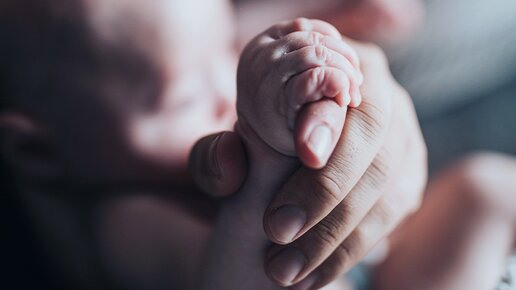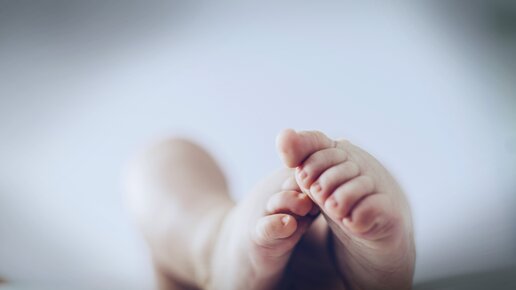As a midwife, I am often approached by expectant and new mothers about hair loss. Many women become very unsettled when they notice that their hair is thinning or even falling out during pregnancy or after birth. Hair loss can be very emotionally and psychologically stressful, especially for women who are already experiencing many changes during pregnancy or after birth. Because hair is considered a beauty feature and is often closely linked to self-esteem. When the hair suddenly thins, it can considerably knock the self-confidence of women and cause uncertainty.
This article is designed to help you understand the reasons for hair loss during or after pregnancy and provide tips on how to deal with it.
How much hair loss is normal during and after pregnancy?
Hair loss during pregnancy and lactation is not unusual. In fact, almost every woman experiences changes in her hair during these phases.
Generally, you lose about 50 to 100 hairs a day. During pregnancy, this loss can often be less, because the hormonal changes keep hair in the growth phase for longer. After birth, however, many women experience increased hair loss, known as postpartum hair loss. Losing up to 300 hairs a day is normal in this phase.
Causes of excessive hair loss:
Why does hair loss occur during pregnancy?
During pregnancy, the body undergoes many hormonal changes. Oestrogen, which is produced more during pregnancy, keeps hair in the growth phase longer and reduces hair loss.
However, if the hormone balance is impaired, e.g. due to stress, thyroid problems or nutritional deficiency, hair loss can also occur during pregnancy.
Causes of hair loss after pregnancy
After birth, hormone levels, especially oestrogen, decrease again. As a result, many hairs move simultaneously from the growth phase to the resting phase – with the result that the hair starts to increasingly fall out a few weeks later. This is a natural process that occurs about two to four months after birth. Hormonal changes, breastfeeding and lack of sleep can further increase this effect.
Boy or girl: Does the baby's gender have an influence?
One common belief is that hair loss, or even the type of hair loss, could have something to do with the baby’s sex. However, there is no scientific evidence that there is a connection between the baby’s sex and hair loss. Instead, hair loss is influenced by hormonal and genetic factors.
Types of hair loss: In tufts and circular hair loss
During pregnancy and after birth, some women notice that their hair falls out in clumps. This can be frightening, but is in most cases a normal reaction to hormonal changes.
A rarer phenomenon is circular hair loss (alopecia areata). This is an autoimmune disease in which the body attacks the hair roots. If you notice circular, dull areas on your head, it is advisable to see a dermatologist.
How long does hair loss last after pregnancy?
Hair loss after pregnancy often begins about two to four months after birth and can last up to six months. In rare cases, hair loss may persist for up to one year after birth. However, hair growth usually normalises after about six to nine months.
What you can do to prevent hair loss: Support with vitamins and nutrients
A balanced and energy-rich diet is essential for the health and beauty of your hair.
Particularly important are special vitamins and minerals such as biotin (vitamin B7), zinc, iron and vitamin D as well as sulphur-containing amino acids such as cysteine, cystine or methionine. A lack of these nutrients can increase hair loss. Omega 3 fatty acids, found in fish oil and algae oil for example, can also support hair growth by promoting the hormone balance and circulation of the scalp and reducing inflammation in the hair follicles.
Biotin deficiency (vitamin B7) is often associated with hair loss. This is because biotin is crucial for the development of keratin, the main component of hair.
A lack of biotin can lead to brittle nails and increased hair loss. While a biotin deficiency is relatively rare, it can occur more frequently in certain risk groups, such as breastfeeding mothers or people with chronic gastrointestinal diseases (also: bad bacterial colonisation of the intestinal flora). Studies show that taking biotin supplements in such cases can reduce hair loss and improve hair growth.
Pantothenic acid, also known as vitamin B5, is another important hair nutrient and as a key component of coenzyme A, this vitamin plays a role in many parts of our bodies. For example, pantothenic acid is involved in the development of healthy skin and is also involved when hair is formed at the root.
In a clinical study it was shown that the 4-month use of a pantothenic acid cysteine preparation in people with diffuse hair loss and a changed hair structure can lead to better hair quality and slower hair loss.
Iron is an important component of your hair:
One study shows that iron deficiency can also play an important role in postpartum hair loss:
- At every birth, the female body loses blood and the iron that is associated with this.
- During breastfeeding, the increased need for iron, combined with the release of iron via the breast milk, can lead to a deficiency.
Iron is necessary to provide sufficient oxygen to the hair follicles. Iron is also a key component of the protein that forms the hair follicles. Insufficient intake interferes with hair growth, which can promote hair loss. Women with iron deficiency after birth often have thinning hair or increased hair loss.
Avoid from the start – can you prevent pregnancy-related hair loss?
It is difficult to completely prevent hormonal hair loss because it is closely related to the natural changes in your body. However, you can do a lot to keep your hair healthy.
Eat a balanced and energy-rich diet, avoid excessive stress, take gentle care of your hair and consult a doctor and/or your midwife for advice in the case of severe changes or uncertainties.
Conclusion
Hair loss during pregnancy and lactation can be worrying, but is in most cases a natural reaction of your body.With the right care, a healthy diet and the right nutrients, your hair growth will usually return to normal. However, if you suspect that your hair loss is out of the ordinary, do not hesitate to seek professional help.
Frequently asked questions about hair loss during and after pregnancy
Maintain a balanced diet and reduce stress. In addition, support your body with a high-quality micronutrient preparation specially designed for pregnancy or breast-feeding.
If you suspect a lack of nutrients, an analysis of the blood values can provide information.
In most cases, hair loss occurs only after birth. It is observed less frequently during pregnancy. If hair loss nevertheless occurs, then usually in the last trimester of pregnancy.
The hair stays longer in the growth phase, resulting in many women having fuller hair during pregnancy.
A lack of biotin, zinc, iron or vitamin D can cause or increase hair loss. An under-supply of sulphur-containing amino acids can also impair hair production.
Hair loss begins about two to four months after birth and can last up to six months, sometimes even up to one year.
A balanced diet, gentle hair care and special supplements can help.
Breastfeeding itself does not cause hair loss, but hormonal changes after birth play a role, which may persist during breast-feeding. A lack of nutrients due to blood loss and “nutrient robbery” by your little one can also promote hair loss.
Sources:
Bhanu, P. F. K., Muzaffar, M. A., Hussain, A., & Haider, M. E. (2021). Iron deficiency and hair loss: A review. Dermatology Online Journal, 27(6). https://pubmed.ncbi.nlm.nih.gov/33946836/
BIOGENA Mikronährstoffcoach. 2024. https://www.mikronaehrstoffcoach.com/de/at/, Zugriff: 15.10.2024
Petri, H. et al. 1990. The efficacy of drug therapy in structural lesions of the hair and in diffuse effluvium-comparative double blind study. Schweiz Rundsch Med Prax. 79(47):1457-62.











